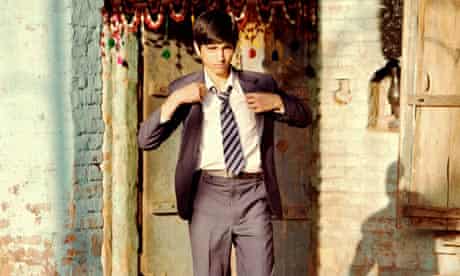British-Asian cinema: the sequel
The Guardian
2011-02-17
Sarfraz Manzoor

Aqib Khan in West Is West.
Twelve years on from the hugely acclaimed East Is East comes its sequel, West Is West. Sarfraz Manzoor examines the new directions British-Asian film-makers are taking
Twelve years on from the hugely acclaimed East Is East comes its sequel, West Is West. Sarfraz Manzoor examines the new directions British-Asian film-makers are taking
Ayub Khan-Din was in his first year at drama school in Salford when his mother was diagnosed with Alzheimer’s disease. Khan-Din, the mixed-race son of a Pakistani Muslim father and a white Catholic mother, found that each time he came home, another slab of his mother’s memory had disappeared. The past, with all its stories, was slipping into the void, and Khan-Din became determined to try to preserve his parents’ history and his own experience of growing up.
Although he was studying to be an actor, Khan-Din started writing. At the time, Asians were rarely glimpsed on screen in the UK unless they were being beaten up by racist skinheads, running corner shops or fleeing arranged marriages. Khan-Din wanted to tell a different story—about growing up with a Pakistani father who had married an English woman, but who wanted his boys to marry Pakistani girls. The play Khan-Din wrote, East Is East, was performed on stage, then released to great acclaim as a film in 1999. Now, 12 years on, comes the release of West Is West, Khan-Din’s long-awaited sequel…
…Like Khan-Din and Monica Ali—whose novel Brick Lane would later be adapted for the screen—Kureishi grew up in a mixed-race family. The particular conflicts inherent in such a background, and the subsequent struggles for identity, were not shared by those such as Chadha and Syal, whose parents were both Asian. My Beautiful Laundrette was not only a personal work but also, Kureishi suggests, the product of an emerging curiosity of mainstream Britain about Asian society. “Around the mid-80s, people in film and publishing realised that Britain was changing,” he says. “I was lucky because I had this great opportunity to write about something that no one else had written about.” The freshness of this material to a wider audience meant many of the films that have come out of the British-Asian subgenre—including Prasad’s My Son the Fanatic, based on another Kureishi short story—operate not only as fictional works but also as quasi-documentaries, revealing a hitherto unknown world. The frisson of familiarity felt by Asian audiences on seeing families like theirs was coupled by the shock of the new that white audiences experienced…
Read the entire article here.

